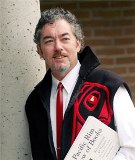By Paul Falardeau (Arts & Life Editor) – Email
 The first round of this year’s university lecture series came to an end on the afternoon of March 16 with English professor Trevor Carolan speaking to a full audience in room B121 on UFV’s Abbotsford campus. The event focused on the idea of community and its changing meaning in the present day amidst prevalent news of war and disaster, both natural and man-made. To this end, Carolan centered his remarks on the life and work of noted Northwest eco-poet and generational sage Gary Snyder.
The first round of this year’s university lecture series came to an end on the afternoon of March 16 with English professor Trevor Carolan speaking to a full audience in room B121 on UFV’s Abbotsford campus. The event focused on the idea of community and its changing meaning in the present day amidst prevalent news of war and disaster, both natural and man-made. To this end, Carolan centered his remarks on the life and work of noted Northwest eco-poet and generational sage Gary Snyder.
Carolan, a member of the faculty of English at UFV for ten years, emigrated from England with his family in 1957. Since his arrival, he has carved out a formidable resume on the west coast of Canada starting at the age of 17, when he filed dispatches for The Columbian newspaper from San Francisco’s Haight-Ashbury counter-culture scene. He hasn’t looked back from there; including extensive travel in Europe and Asia, he has put in time in municipal government, served as the first executive director for the Federation of BC Writers, and as Literary Coordinator for the 15th Olympic Winter Games Arts Festival in Calgary, published 16 books, and has worked as media advocate on behalf of international human rights, Pacific Coast watershed issues, and First Nations land claims. He holds a MA from Humboldt State in California and a PhD from Bond in Australia.
Amongst these and others, perhaps the most notable of Carolan’s qualifications are his time spent under the tutelage of the Beat poets Allen Ginsberg and Gary Snyder. The latter of which is the subject of Carolan’s extensive essay “Ecosystems, Mandalas and Watersheds: The Dharma Citizenship of Gary Snyder,” found in the recent joint release from Anvil and UFV press, Making Waves: Reading BC and Pacific Northwest Literature. This essay formed the basis for the talk given to the UFV audience.
The first time Carolan encountered Snyder in person was at Hollyhock Institute in 1985, after he first researched Snyder’s poetry during his Master’s work. They have since corresponded and Carolan has written extensively on Snyder’s work. They have also collaborated on several critical interviews, one of which – “The Wild Mind of Gary Snyder” – appeared in Shambhala Sun magazine in l996, and is now a frequently cited source in Snyder research studies.
The well-attended lecture focused on how Gary Snyder continues to inform the heart of our contemporary ecological discourse. “With his emphasis on ecological stewardship,” Carolan states, “his ideas compel us toward a rethinking of what citizenship might mean in the global age.”
Snyder’s ideas come back to a relationship that sees the ‘inter-relatedness’ of humanity and the natural world, rather than an oppositional, dualistic world-view in which humans assume a position of dominance over nature. Throughout the speech, Carolan reminded the audience of Snyder’s terms “etiquette of freedom” and “a practice of the wild,” relating them to such practices as yoga, daily meditation, or prayer.
Furthermore, Carolan emphasized how Snyder’s “Turtle Island” view, named after his Pulitzer Prize winning poetry collection and the Native American myth from which it takes its name, brings us in contact with traditional, widely-held First Nations understandings of this continent of North America – of which we can all come appreciate ourselves as being truly inhabitants – not conquerors. Carolan summarizes this, saying, “The idea of fully inhabiting a place spiritually, economically, and compassionately in respect for other forms of animal, natural, and even non-sentient forms can be seen as an engaged form orf“bioregional” citizenship.”
“And one good way we can practice responsible stewardship” reflects Carolan, “is to engage in the sometimes tiresome, but necessary work of true community engagement in the day to day civic decision-making processes of our schools, air & water quality boards, local council government, environmental quality committees, and so on.” He went on to suggest a need for becoming self-organizing and self-disciplined, living a little more lightly and simply.
The fulcrum of Carolan’s lecture, and the true center of Snyder’s legacy, is the development of “Green Spirituality” among people of various world faiths. Concluding, Carolan said that “Through the influence of such ecological ideas, something close to an actual school of thought is developing here on the west coast, and we can imagine this as a new way of regarding what citizenship can, and perhaps needs to, be, in our evolving 21st century.”
Following the lecture, a lively Q & A session allowed audience members, including students, professors, and community members, to engage with the professor concerning his material. The lecture was the last in the current series, but administrative representatives assured the crowd that more were in the works to appease the popular demand this first round has generated.
Making Waves is available at the UFV Bookstore, at fine book retailers, and online from Anvil Press, and includes work from several professors, students and alumni of the University of the Fraser Valley.

